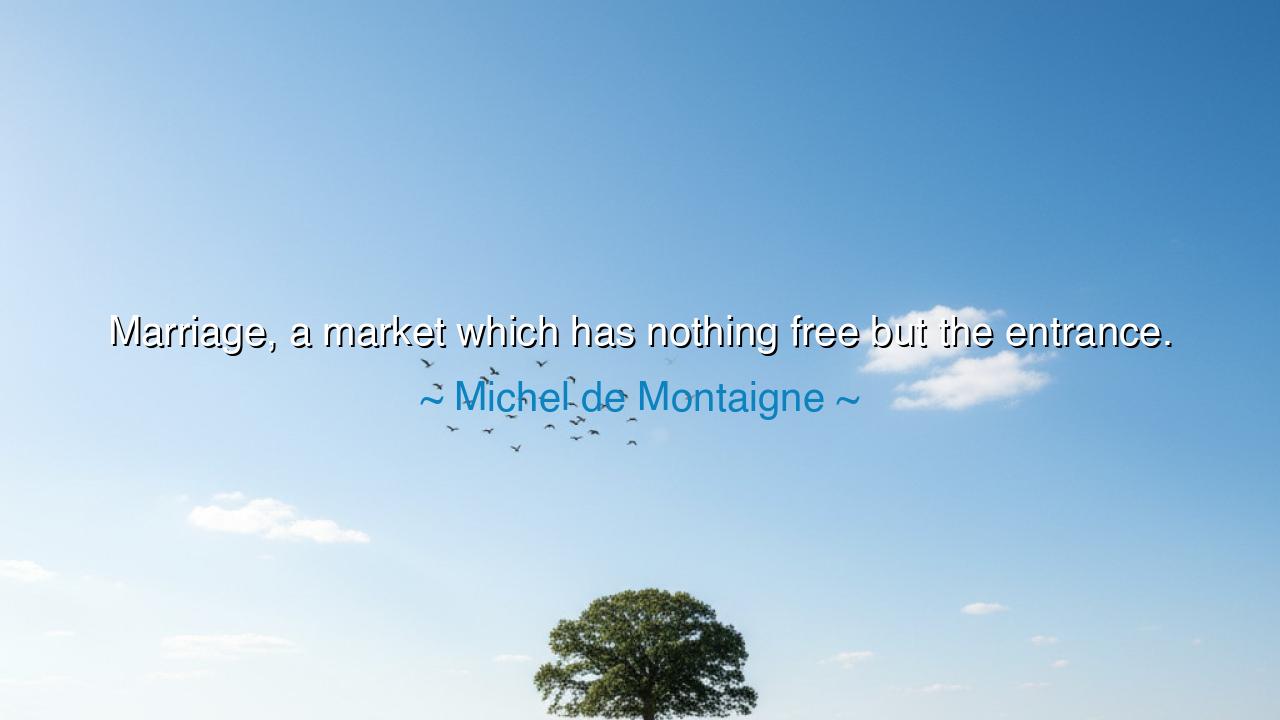
Marriage, a market which has nothing free but the entrance.






Hear now, O seekers of understanding and lovers of wisdom, the words of Michel de Montaigne, the philosopher of the soul and the mirror of human folly: “Marriage, a market which has nothing free but the entrance.” These words, though wrapped in wit, conceal a truth both profound and timeless — that what begins with liberty often binds us in duty, and that the vows of love, so easily spoken, carry with them the weight of a lifelong covenant. Montaigne, with his keen eye upon the nature of man and woman, saw marriage not merely as romance or sentiment, but as a contract — a sacred yet worldly exchange where hearts and fortunes alike are bartered, and where freedom, once surrendered, is transformed into responsibility.
To say that marriage is a market is not to profane it, but to reveal its complexity. In Montaigne’s age — the sixteenth century — unions were often arranged not for passion, but for alliance, for property, for legacy. Yet even now, his insight holds. Marriage, he observed, begins in choice: the entrance is open to all, driven by love, lust, or longing. But once the threshold is crossed, the soul discovers that this market has laws of its own — obligations that must be met, compromises that must be endured, and sacrifices that must be made. In other trades, one may withdraw when the price is too high; but in marriage, the bargain binds body and spirit alike. Thus, the entrance is free, but the dwelling demands cost beyond measure.
The origin of this thought flows from Montaigne’s lifelong reflection on the nature of freedom and human frailty. He was a man who revered love but distrusted illusion. In his Essays, he pondered not only philosophy but the private workings of the heart — how affection, once bound by law, transforms into duty. To him, marriage was not the enemy of freedom, but the test of it. He believed that those who entered it should do so with eyes wide open, understanding that liberty within love requires wisdom, patience, and restraint. For though the entrance is free, remaining within with grace requires both strength and humility.
Consider, my listeners, the tale of Henry VIII of England, whose passions led him through six marriages and an empire’s upheaval. To him, the market of marriage was one of power and desire, yet each entrance, though free, brought heavier chains. He sought love, heirs, and control, yet found himself ever more imprisoned — by conscience, by consequence, by the ghosts of his choices. His story is a warning carved in history: that the freedom to choose one’s love is no guarantee of freedom within it. The vows we take lightly can become the fetters that test our very character.
Montaigne’s words, then, are not a condemnation of marriage, but a call to reverence. He urges us to see beyond the charm of the beginning — the music, the beauty, the intoxication — and to recognize the sacred seriousness of what follows. In this market, every exchange must be fair: love for love, patience for patience, forgiveness for forgiveness. Those who seek only pleasure or ease within it will soon find the cost unbearable, for marriage demands not only affection but labor — the daily tending of trust, the continual renewal of respect.
Yet within this “market” there is also grace. For those who understand its price and pay it willingly discover a treasure far greater than freedom itself — the peace of companionship, the deep joy of being known and accepted fully. The loss of freedom becomes a transformation of it: two wills learning to harmonize without one conquering the other, two hearts learning that true liberty lies not in separation, but in unity. Thus, the market Montaigne speaks of is both perilous and divine — perilous for the selfish, divine for the devoted.
Therefore, O listeners, take this teaching into your hearts: do not treat marriage as a gate of convenience or a transaction of desire. Enter it with awareness, with reverence, with readiness to give more than you receive. Remember that freedom is not lost within commitment; it is refined. The entrance may be open to all, but the journey beyond it belongs only to those who dare to love not as merchants seeking profit, but as pilgrims seeking truth.
Thus spoke Michel de Montaigne, whose wit carried the weight of wisdom. His words remind us that every covenant of love is a mirror of life itself — freely begun, yet costly to sustain; joyful, yet demanding; binding, yet liberating in the depths of the soul. Let us, then, approach the sacred market of marriage not as traders of affection, but as stewards of something eternal: a partnership where the price is selflessness, and the reward is the infinite richness of shared humanity.






AAdministratorAdministrator
Welcome, honored guests. Please leave a comment, we will respond soon